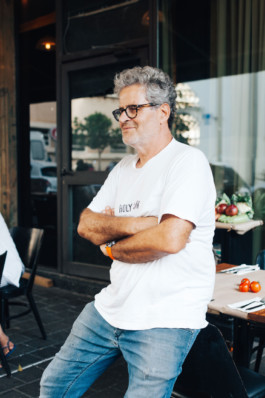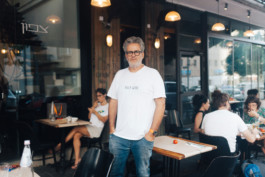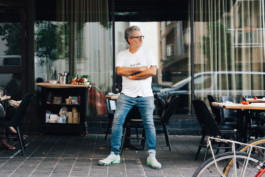
Episode 13:
Eyal Shani
What is Israeli food and why is it winning over the world?

Eyal Shani, Israeli celebrity chef, founder of Miznon and some of the most respected and popular restaurants in Tel Aviv, Paris, Vienna, Melbourn and New York. Shani explained to YOMYOM why chutzpa in cooking is a must, how tomatoes have their own will, why there aren’t any cool restaurants in Jerusalem and why fine dining is dying out the world over.
Israeli cuisine seems to be a world trend today.
— It is.
What does “Israeli cuisine” actually mean? Is it just a type of Arabic cuisine? What are its unique features?
— You have to understand the Israeli character to understand what Israeli cuisine is. There are no specific dishes that fully represent it. There is hummus, falafel, shawarma — but they belong to the past. We’re now talking about a cuisine that has been developing for the past 20 years. I’ll give you an example to show you the essence of Israeli cuisine. When sushi arrived in Israel 30 years ago, it took Israelis less than one year to make a sushi roll with schnitzel wrapped in seaweed. Israelis are people that have no rules because they have no roots in this country. Israeli cuisine is a form of “chutzpa” [“impudence” or “shameless audacity” in Hebrew]. Israelis have no borders, no laws and no God when cooking. They take a thing and smash it. Most of the time the result is terrible. But because they are very fast and innovate all the time, even if they only succeed 5% of the time, they create a whole new language of cuisine.
Israel is a small country with a lot of people that came from all over the world — Yemenite, Polish, Russian, Romanian and others — combined into one hybrid. The DNA of this hybrid is very successful. We’re like nitroglycerin. You combine together all these simple ingredients and it becomes a bomb.
The other extremely important feature of local cuisine here is its freshness. It’s a very small country; if a vegetable ripens in the field in the morning, by evening it may be on your plate. That’s something amazing! It changes the game. To live on the Mediterranean and to have fruits and vegetables that are picked and immediately served is like eating pieces of the power of God.
Why is there such a high turnover rate with restaurants in Tel Aviv?
— It’s a very tough business. Look, we have 10 restaurants in Tel Aviv. We feed about 3500 people a day. Everyday I have to make 3500 people passionate about my food. The profit in this business is so low — about 10% if you’re managing it in the best way possible. One mistake and you even lose that. It’s so easy to collapse in this business! But our purpose isn’t money. It’s day-after-day, dish-after-dish, ingredient-after-ingredient work. It’s a very complicated job, but if you ask me to analyse the way I do it — I simply don’t know! I think it’s all about a strong belief in what you’re doing. We’re like a religion here — there are 600 workers that believe the way I do about food and hospitality.
There are many cool street food and casual places all over Tel Aviv, but almost no fine-dining places where you need to dress up for dinner. Why is that?
— There are manners and there is fine food. They have nothing to do with each other. Jackets, suits, tablecloths, crystal glasses, waitresses with manners — they’re not relevant anymore, not in Israel and not in the world. Fine-dining isn’t connected anymore to the quality of food. You can find a hole in a wall that sells falafel so simple, yet so precise, that when you taste it you say: “This is what I need in my life!”. Fine-dining gives you an experience of being aristocracy. It’s nice to try it once or twice in your life, but it costs so much that it’s filtering out most people. As a result you see old people sitting in three-star Michelin restaurants, and you can hear their forks and knives hitting the plates while they’re eating. It looks terrible because for good food it’s like being in a coffin. Food is a dynamic thing, it’s about energy, it’s about life. There can be no walls around food; it should belong to the streets.

Today’s chefs are like rock-stars, but you started 30 years ago. Could you have imagined then becoming this popular?
— When I decided to become a cook, my parents asked me: “Are you insane?! You learned cinematography, go find work in filmmaking! What’s wrong with you?”. But I still don’t see much difference between creating films and creating dishes. It’s all art.
There were about five cooks that followed me in a year or two. 30 years later and all of them are still the masters of Israeli cuisine. Since then, almost no one new has came onto the scene to take the crown.
Why?
— Because when we began we didn’t have the internet. It was very expensive to fly abroad. The only connection to the world was foreign cooking books. We looked at the pictures and got inspired by them. We were very persistent in our research and we had enough time to look into the depths of ourselves, as there was nothing else to look at. In the beginning I tried to follow and copy European Michelin restaurants. It took me a year to understand that these recipes don’t really belong here. Israeli culture is fast, common, and has no royalty — it belongs to the streets. Those were the landmarks to follow. We weren’t confused by too much information. Today, you open the internet and get oceans of knowledge coming at you. How can you find yourself out there? We began from nothing and we had the opportunity to discover ourselves. Modern cooks don’t have to discover anything. They have no power because they don’t create the story. So they’ll have to wait until we die to come up to the stage.
Why has food become the number one art and entertainment today?
— Because it’s the easiest art. Your blood and mind welcome food. Food is a very direct and immediate thing. When you’re hungry, something seduces you and you eat it. You don’t need to stand in front of a piece of art, to analyse it, to find out what’s in the background. Food is immediate. People have become much more passive today, but food has its own legs to get into your body, your soul and your brain. Besides, while cinema and music are talking about conflict, food is talking about happiness. We can be enemies, but when we sit and eat together we’re best friends; we’re just two animals eating and nothing else.
You've recently opened a kosher restaurant. You’re not religious. So kosher might seem like a senseless restriction on the art of cooking to you. What do you think?
— I’m not religious at all, but I feel that I have a mission in life. It’s to create a cuisine for the Israeli nation. People came here from all around the world to build a country but they forgot to build a national cuisine.
Now, I’ll explain to you why I opened a kosher restaurant. I’ve worked for almost 30 years and all this time I’ve cooked for the same audience — secular, young Tel Avivians. They are beautiful people, but Tel Aviv isn’t Israel, it’s a very small part of the country with a lot of noise around it. All these years I saw religious people like kids looking at us, wanting passionately to try what I cook but unable to. When I realised that my mission is to create a food culture in this country, I understood that I was working for only a tiny part of Israeli society and that I must widen it for religious people.
You’re right, I can’t live with limitations, but we live near the Mediterranean Sea. All the Mediterranean cuisines are in substance kosher — olive oil, a lot of fish and vegetables, almost no meat. In all my regular restaurants there are milk and butter — but they aren’t essential to my food. It was very easy for me to take it out. I didn’t have to limit myself in any way.
Usually kosher restaurants are full of darkness. They’re not about celebrating life, but about existing and surviving. There is no happiness in them and customers don’t ask for much because they don’t know what good food is. So I decided not to wait until they ask, but to give. I simply made my usual restaurant, open and full of light, but with kosher food. Now we have about 400 smiling people a day in there.
Why isn’t there a restaurant boom in Jerusalem, like Tel Aviv? It's the capital and a tourism Mecca.
— I was born in Jerusalem. It used to be an amazing city. All the Israeli thinkers and artists were there. It was a small city and it’s colder weather made it feel like a European city. It was a paradise. But the Six Day War happened and Israelis took the areas of the Palestinians. Jerusalem became bigger and a lot of money came into the city in the process of occupation. Then the Intifada began. It destroyed Jerusalem. The fear destroyed it. Slowly, slowly the city was left by its lovers and its dreamers. The power of New York for example is that 7.5 billion people around the world are dreaming about it. But imagine a woman that nobody dreams about… I can’t make food in a place that nobody is dreaming about.
A friend of mine, an old Swiss man who is an owner of the American Colony Hotel in Jerusalem told me once: “If the people of Tel Aviv would replace the people of Jerusalem, there’d be peace already”. He’s right. Jerusalem is full of madness and blood. It attracts all the crazy, radical, and fundamentalist people.
You’re a self-taught. Do you think there’s any need to go to cooking classes for those who want to become chefs? Or are practice and finding a good mentor much more important?
— Recipes and techniques are not essential subjects to learn in the art of cooking. You can learn them by yourself using youtube and cookbooks. It’s complicated, but you can learn if you have the will. Much more important is the mind of the chef. Why is he doing this and in what way? It’s the creation. Even the way you are cutting a slice of white bread can be a piece of art. Where do you put the knife? What is the thickness? The thickness is not about centimeters, it’s about the balance of the bread and what covers it. To be a chef isn’t to know cooking but to understand the world, shapes, dynamics, psychology, physics and mathematics. You learn it much better from the restaurant kitchen than from cooking school. Don’t lose time on techniques. Go to restaurants, find inspired chefs and learn from them.
What principles and ideas do you teach your sous-chefs?
— Imagine that I take a glass of water, put it on the edge of the table and let it fall. If I ask you, why did it fall, you’d say: “gravity”. You’d be right, but I believe that another explanation is that the glass had the will, the intention, to fall. A glass, a loaf of bread, a tomato, a cauliflower all have will as well, just as people do. For me they’re not something but somebody. Frank Lloyd Wright, the great architect, said that each block has a will to be in a precise place of a building, and if you don’t understand that will — don’t build houses. Each thoughtful person working with materials recognises very quickly that he is not superior to his materials, but equal to them. When he realises this, he can begin to talk to them and to recognise the signs that materials are giving him. In the beginning, people laugh at my words, but slowly, slowly they come to understand and, as a result, they become completely different cooks afterwards.
Today, people everywhere in the world go crazy for "healthy" food and diets. There are thousands of theories about how to eat and when to eat in order to look and feel better. And all of them say something different. It's so confusing! What do you think about this “healthy food” obsession?
— Each ingredient has been created for thousands of years to become the way it is. There is a lot of knowledge inside of it, a lot of health. The word “superfood” is disgusting, because it means that there are superior ingredients and inferior ingredients. All the ingredients are perfect and complete in their evolution. If you want to eat healthy, look at the ingredients, learn from them and respect them. It’s enough. If you’re not paying attention to what you eat, eating “superfoods” won’t help. Eating healthy means being focused on things you eat, and not being confused by the noise around them.

Text Asya Chachko
Photo Masha Kushnir
more episodes
© 2017–2024 Made in Tel Aviv with love. Email Us, Follow on Facebook